Release Report Scope 23.10
Air Freight
CarbonCare API version 3.0 enables calculation change to ISO 14083:2023
The implementation of new CO₂ CarbonCare interface version 3.0 enables Scope to effectively change the CO₂ calculation as per January 1, 2024 to transition from EN16258 to ISO 14083:2023 which will be our new standard for emissions calculations. The transition is triggered depending upon the commercial month of every individual shipment in Scope. This process ensures a clean distinction in statistic data for shipments “to 2023” (EN16258) and shipments “from 2024” (ISO14083). The new calculation method comes with updated value descriptions and two new CO₂ values which are available as per Jan 1st, 2024 for statistics and printing:
- Number of TonKilometers: Corresponding to the transport of one ton over a distance of one kilometer (tkm).
- Emission rate (kg/tkm or g/tkm)
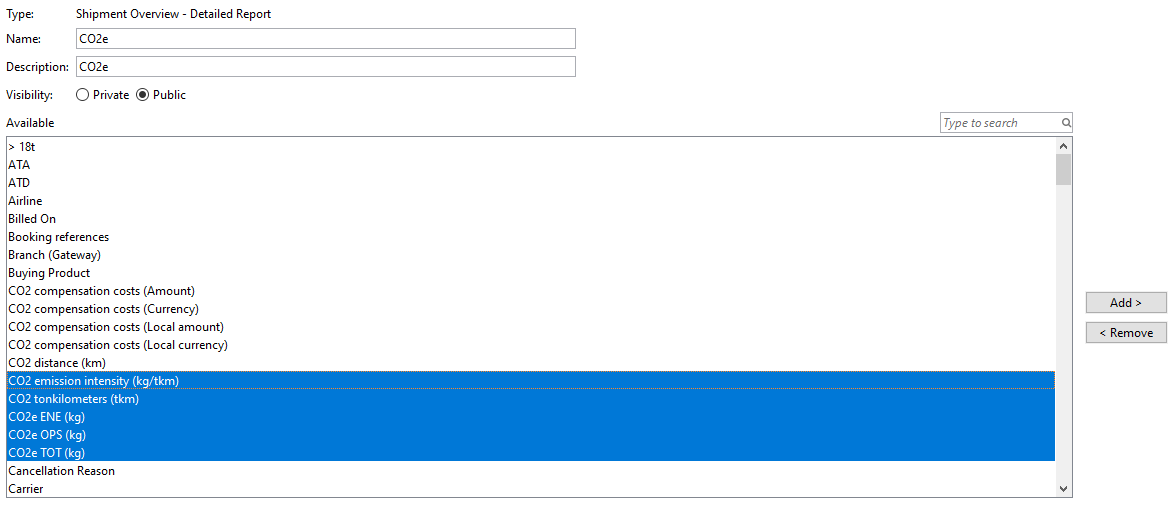
Scope clearly states which standard has been used to calculate the emission data. For ISO 14083, the new fields labels CO₂e TOT, OPS, ENE are used, for EN16258 the old labels (TtW, WtW) are displayed.
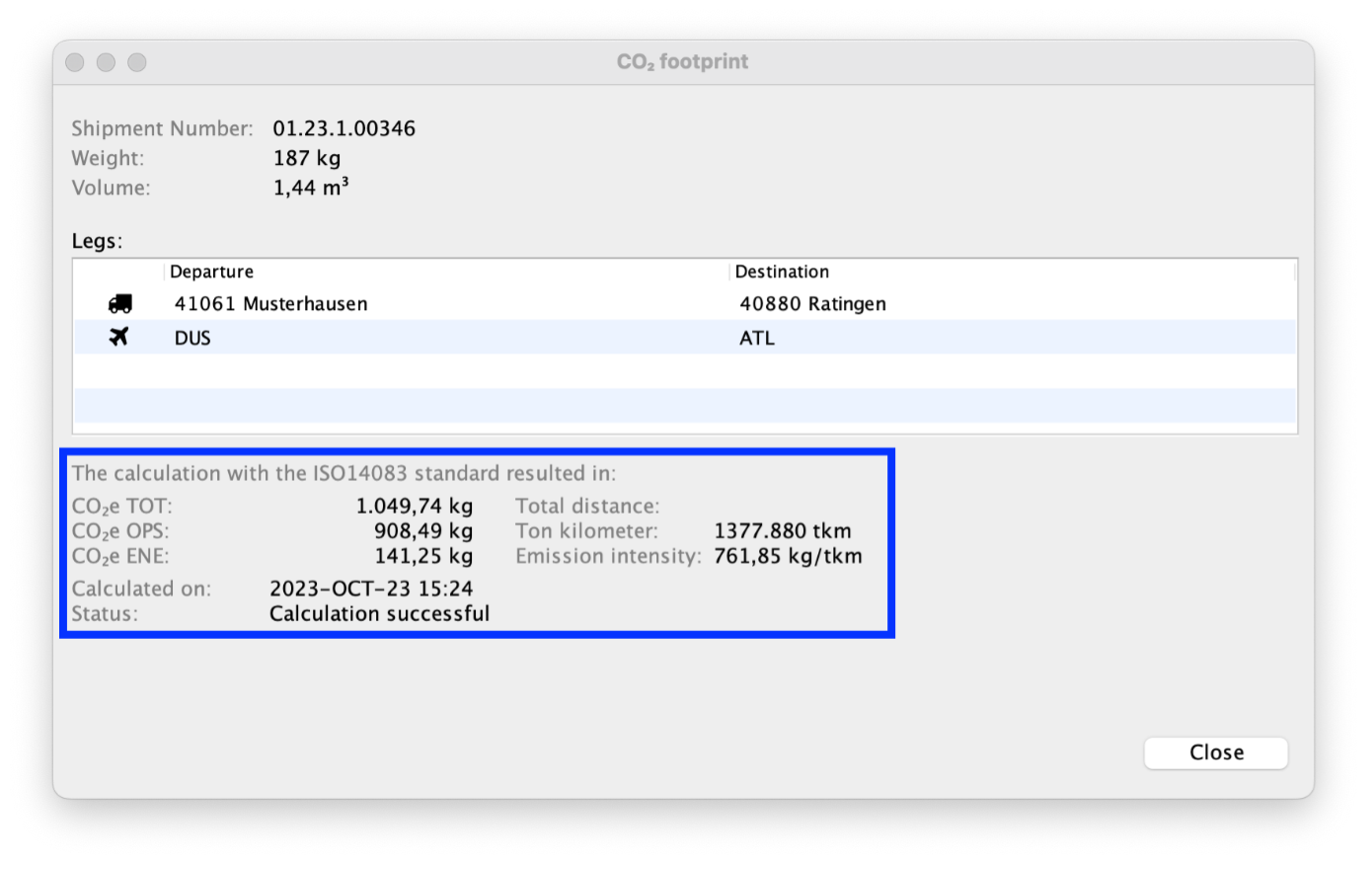 For CarbonCare business customers the new method comes with a PDF indicating an overview of all values per leg and in summary. This PDF is integrated in Scope on shipment level.
For CarbonCare business customers the new method comes with a PDF indicating an overview of all values per leg and in summary. This PDF is integrated in Scope on shipment level.
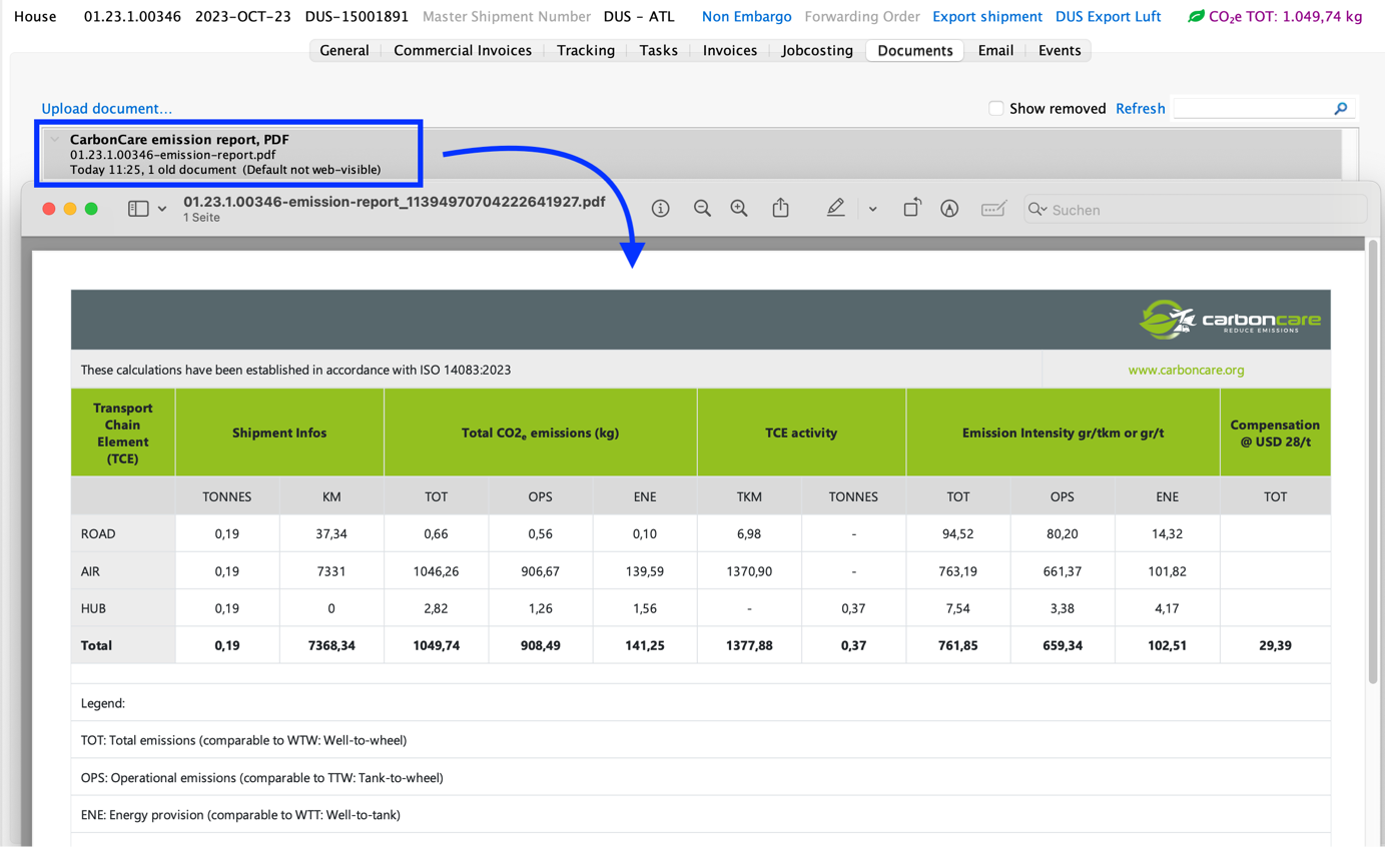
More about the methodology: CO2 Calculator Methodology
More about CO₂ calculation in Scope: CO₂ calculator for each shipment in Scope: with CarbonCare
New Air Export EU Security provides more transparency and clearness of RA/KC check
We have increased the transparency in Scope when and how a RA/KC number was validated against the EU database. Manual and batch checks are more clearly distinguished, search queries for a partner no longer show in the shipment security check history view.
By improving logging we accomplished more clearness about who accepted which RA/KC number to which Scope partner including log of the official EU RA/KC database address of the partner.
Finally, we removed the security declarations section in partner master data which is no more valid in the EU.
Consolidation of bookings for import now available
We added the possibility of consolidation of bookings for Air and Ocean Import shipments. The workflow is similar to existing option for Export shipments.
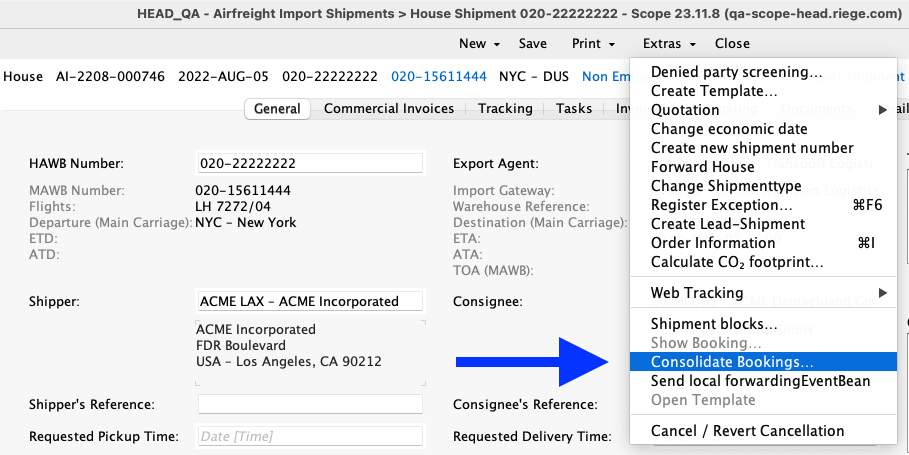
Clean-up dialog in Shipment Monitor enhanced and improved
The Shipment Monitor received a new dialog in which the options for cleaning up Tracking plans and Milestones have been enhanced by the clean-up option for “Failed actions”. This goes along with better explanation of the selected option.

Improvements, enhancements and fixes
Shipment number search:
It is now possible to quick search for last 4 digits of a shipment number.
Shipping Order Interface:
The interface now allows to provide the supplier for road transports.
Validation for transport orders and shipments:
- In Transport Order the EDI warning when transport order road carrier is empty has been fixed
- To prevent interface transmissions with empty or zero piece values, the Transport Order now displays a Validation Warning if the road carrier has no EDI-profile assigned. If an EDI-profie is assigned, it is displayed as Validation Error.
- In Air Export the validation icon priority (prioritize errors over warnings) for the “LAT time later than ETD” validation has been fixed.
IATA special handling codes:
Two new IATA special handling codes CIC (Cargo may be loaded in the passenger cabin) and EMD (Electronic Monitoring Devices on/in Cargo/Container) have been added.
Smaller fixes and improvements:
- In Air Import Print Pre-Alert the consignee's language is reflected when generating pre-alerts.
- In Consolidation Flight Schedule label overlapping in overview detail section has been fixed.
- Various tables which lost their custom user column configuration after a Scope client restart have been fixed.
- SLAC from export shipment to main transport has been synchronized.
Ocean Freight
New conditioning of B/L Instructions in Ocean Export
When initializing new B/L instructions for a given Ocean Export shipment or master, the ‘freight terms’ are not initialized anymore, because Scope cannot predict a decent default terms value in any case. Consequently, a new validation has been implemented, which validates that the freight terms are set to avoid to not leave the value blank.

In addition, the Ocean Export shipment general tab displays the status of the B/L instructions transmission – adequate to the status of the Vermas message.
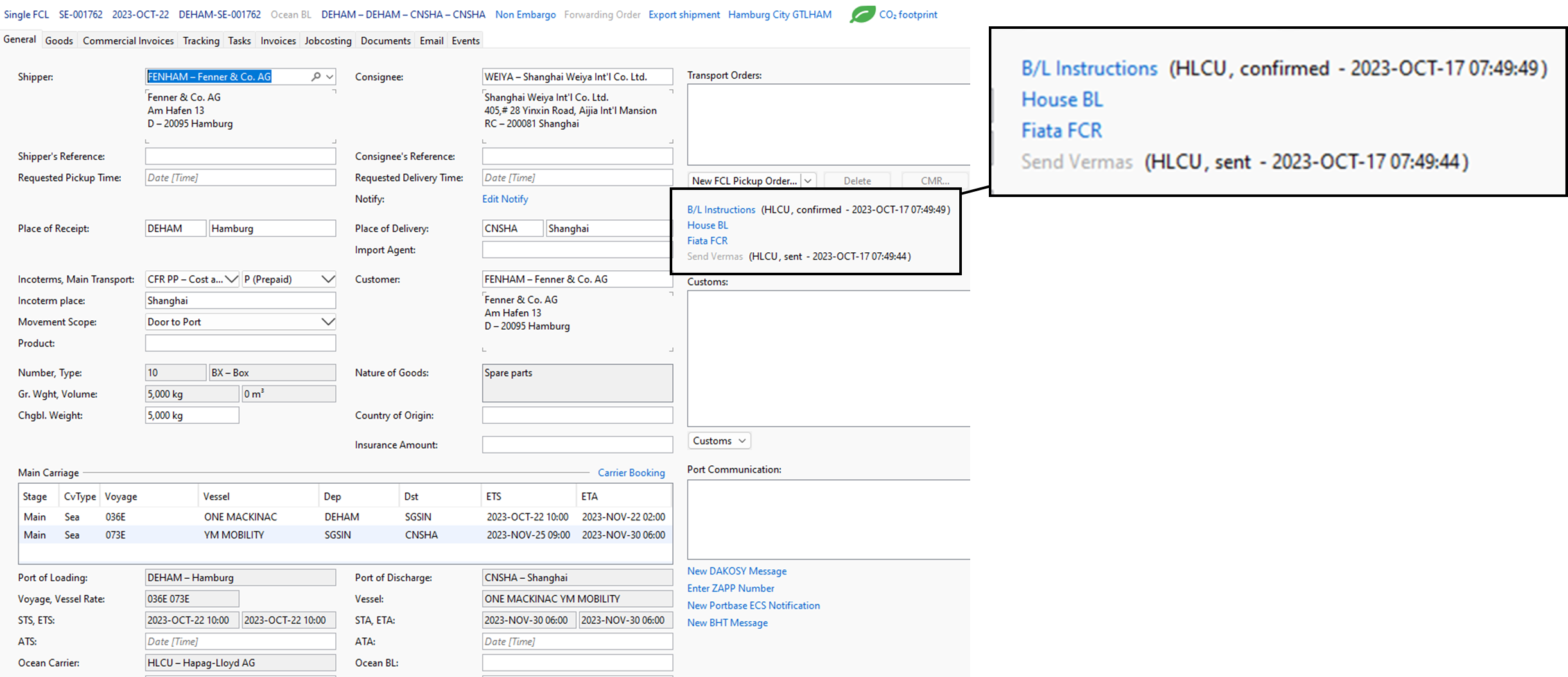
Dakosy appliance displays clerk in charge
A new optional column "clerk" is available, and the displayed person represents the clerk of the outgoing Dakosy messages such as HDS, IMP, BL, Quay Order.

Chargeable Weight calculation in Simple Shipment now on package level
Chargeable Weight calculation in Simple Shipments can now be done on package level. The chargeable weight will be calculated individually per package. The complete shipments’ chargeable weight will concludingly be calculated as the sum of all package level chargeable weights.
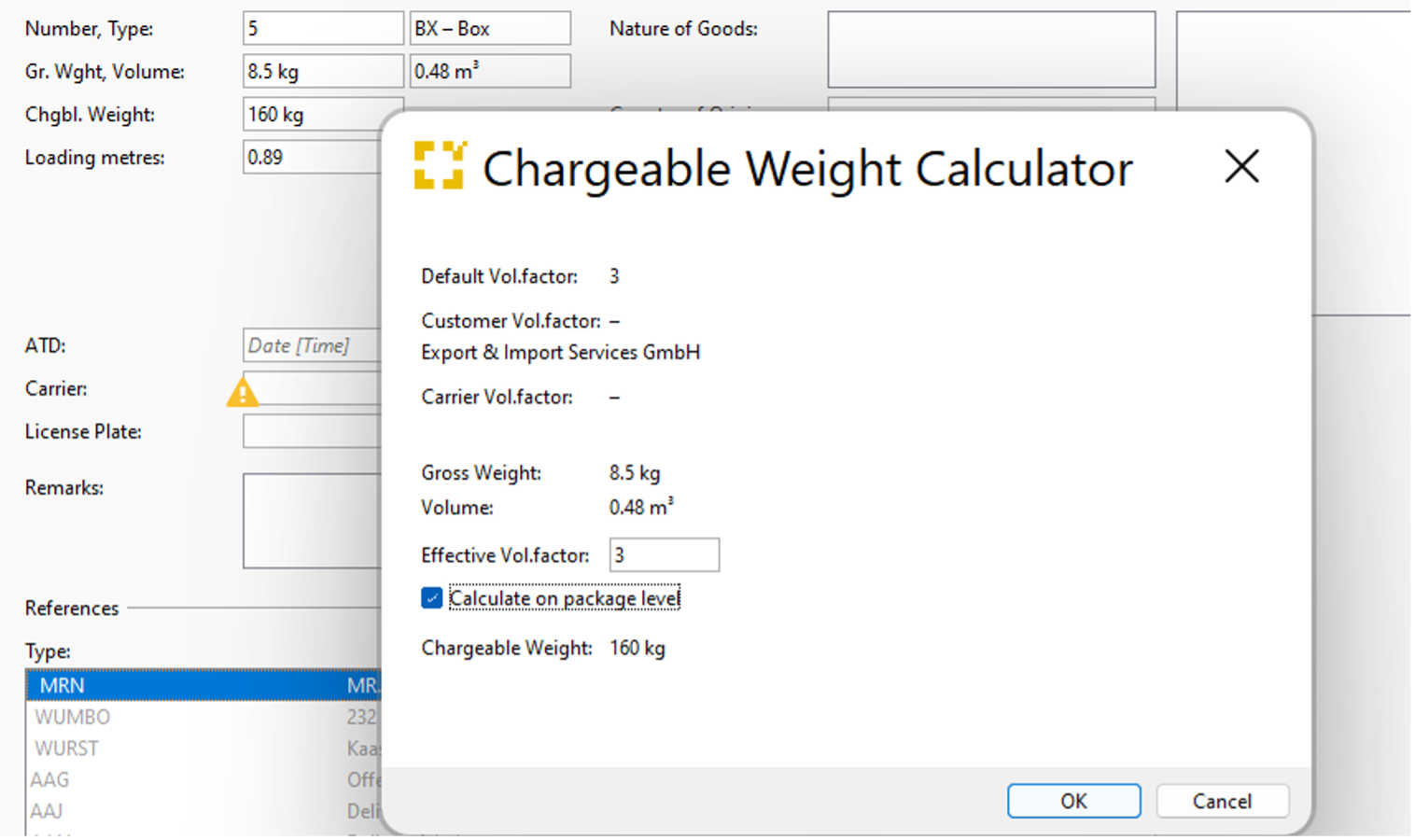
Tour Processing in Simple Shipment simplified
Tour Number is now available as Hyperlink within Simple Shipment to easily access the related tour by a single click.
Tracking on Container Level now possible and remarkably easy to use
Scope now provides tracking, events and tracking plan templates on container level. The setup of tracking plans got major usability configuration enhancements. which makes it easy to create and maintain these tracking plans. In addition, a new Container Monitor has been implemented providing a quick overview of container level status information.
1. Container Level Tracking Plan
Tracking Plans can now include repeatable groups per container.
![]()
2. Milestone Templates
Several Milestone template types are available to easily create new Milestones for container level tracking plans. These plans include a complete set of decent defaults for all important milestone setup values.

3. Default Tracking Plans
When creating new tracking plans, Default Tracking Plan templates are available which provide fully featured container tracking plans for Export, Import and combined Export & Import. They can be created by a single click and contain a complete default setup with milestones, repeated groups and tracking plan applicability.
![]()
![]()
4. Container Selection in Shipment Tracking Tab
The shipments tracking plan tab provides a container selection to restrict the milestones to the selected container.
![]()
5. Container Monitor
The new Container Monitor provides an overview of the container level tracking status. It shows the complete container lifecycle in a single line. Additionally, an overall container status is displayed indicating the current summarized status for each container.
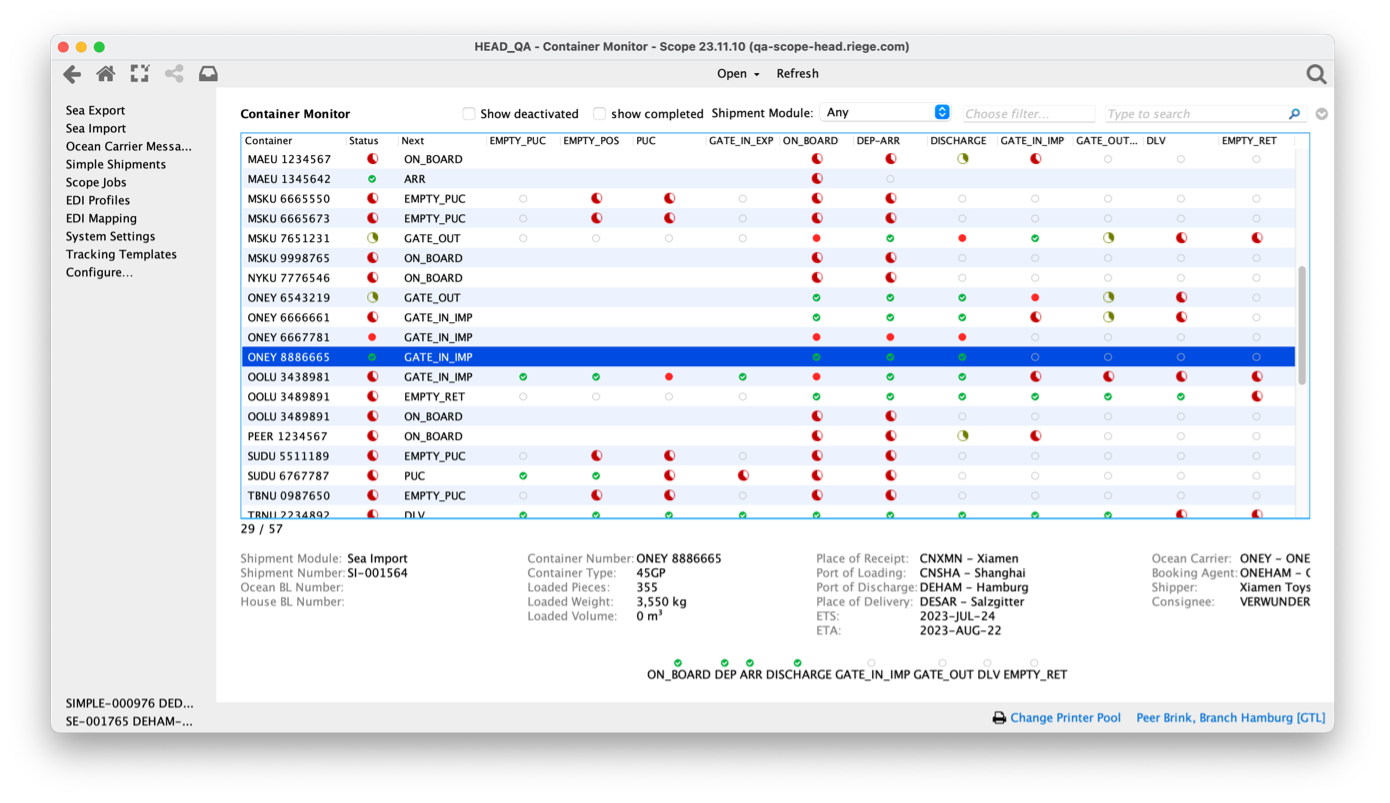
Improvements, enhancements and fixes
Ocean Export Consolidation:
When deconsolidating house shipments from an Ocean Export master, the port specifications for departure and discharge remain in the deconsolidated shipments. This makes it easier to consolidate the house on another master.
Pre-alert:
Pre-alerts can now contain totals for packages/grossweight/volume – inbound as well as outbound.
Ocean Carrier EDI timezone fix:
The timezone for events from Infor Nexus has been fixed.
Transport Order:
Total number of containers and/or TEU can be incorporated within the document.
Finance
Jobcosting may now be displayed in organization currency
The display for Jobcosting in the national currency is located on the Jobcosting tab of each shipment. This feature is available in all shipment editors, in the shipment and the transport order overview.
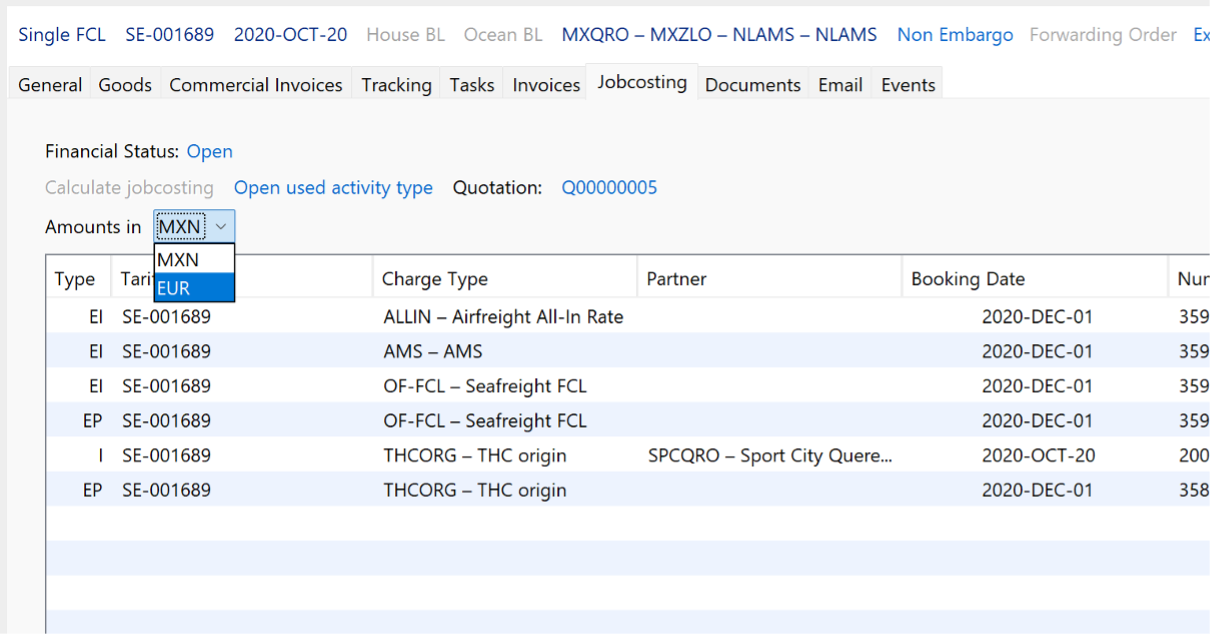

In addition to that Shipment overview reports and Transport Order overview reports can also be created in organization currency.
Enhanced definition of economic date of shipment
It is now possible to define an offset in days to determine the economic date of shipments. The offset is added to the selected base date, e. g. ETA + 3 days. By default the offset is set to 0 for all modules. To change the setting the Scope Service Team needs to be contacted.
Locking of billing relevant fields on partner
A new option has been implemented to lock billing relevant fields of partners that have a debtor and/or creditor role in at least one legal entity. The locked fields can still be edited with a special permission. The Scope Service Team will activate the option and grant the permission to selected users.
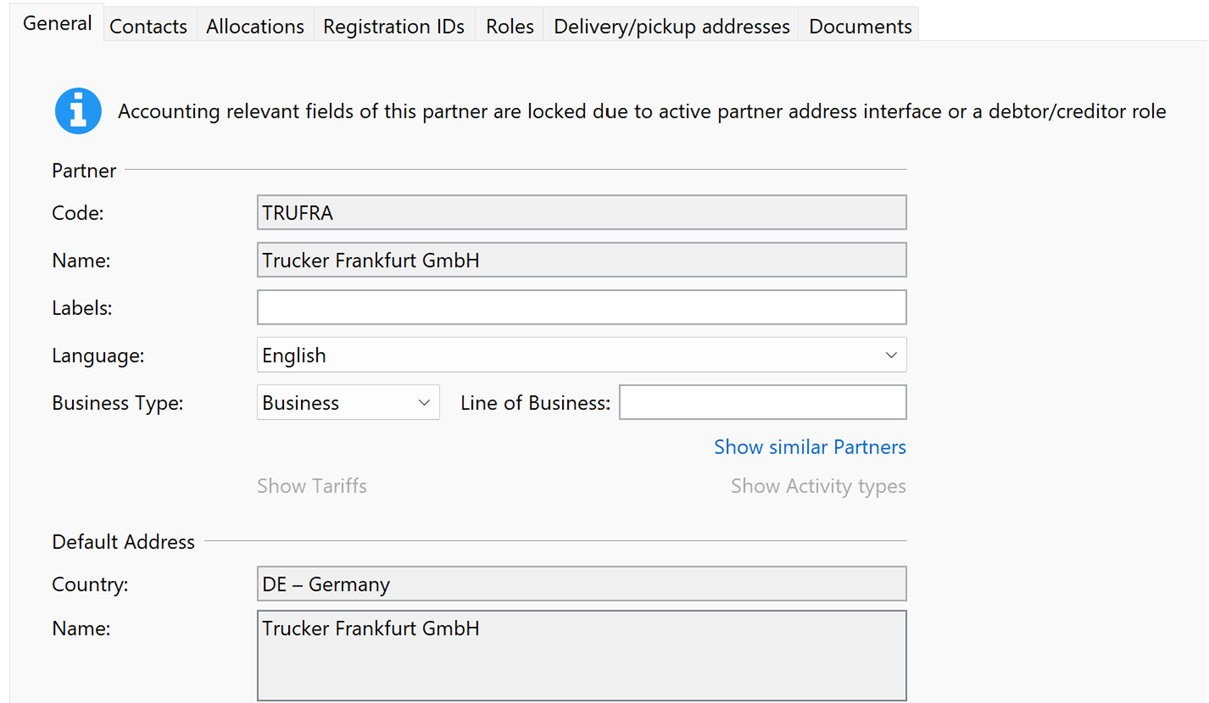
Select document type when uploading files via drag & drop
When uploading a file to the documents tab via drag & drop a new dialog prompts the user to choose a document type for that file.
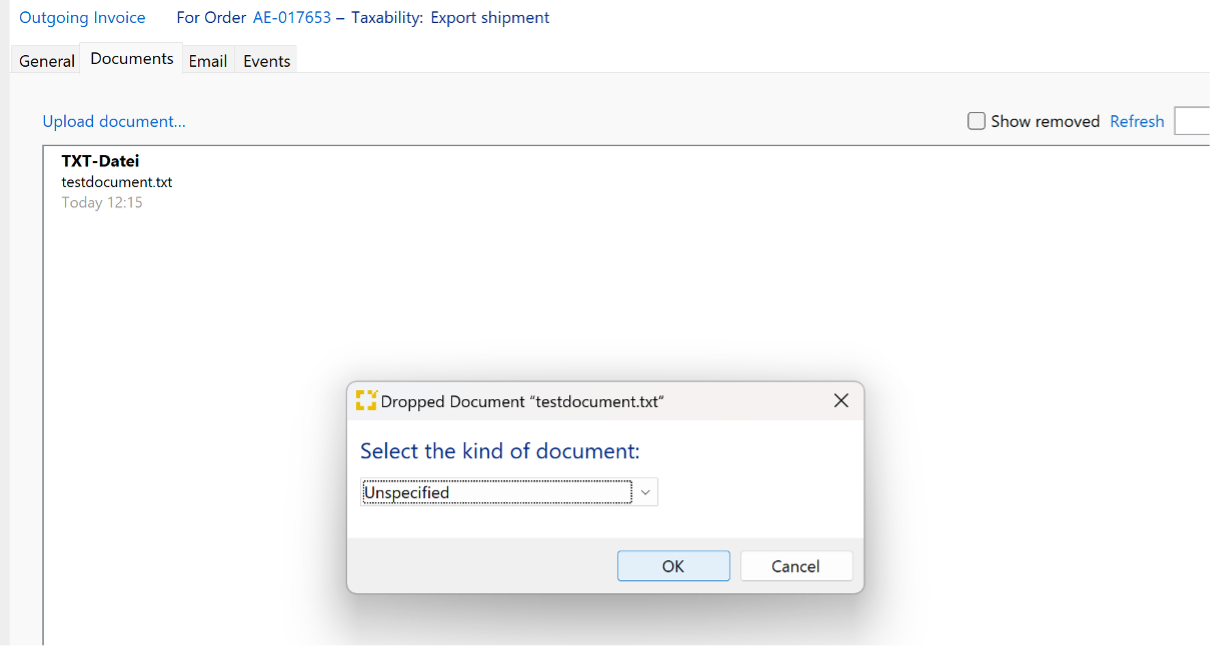
Customs
ICS2 available for air freight forwarders in Scope
ICS2 is available for air freight forwarders – especially in the "House-Filer" role. This allows them to register their shipments in the PLACI module on the central ICS2 system and thus receive the "Assessment Complete" before transfer to the carrier. Initially, the "F23+F25" scenario is available, which concerns the shipment registration including changes plus the addition of MAWB data.
The "House Filer" role:
- Sending the house consignment data to ICS2
- Receiving the MRN and the "Assessment Complete"
- Receipt of "Referrals" and "Request for Documents"
- Digital transmission of the requested documents to ICS2
- Request for cancelations
Further functions in Scope:
- Dashboard for monitoring consignments, including filters on the applications to be processed
- Drag & drop of documents, attachments and documents from folders or emails to respond to the "Request for Documents" (as in all other Scope modules) ICS2 registration/header data

ICS2 registration/HAWB data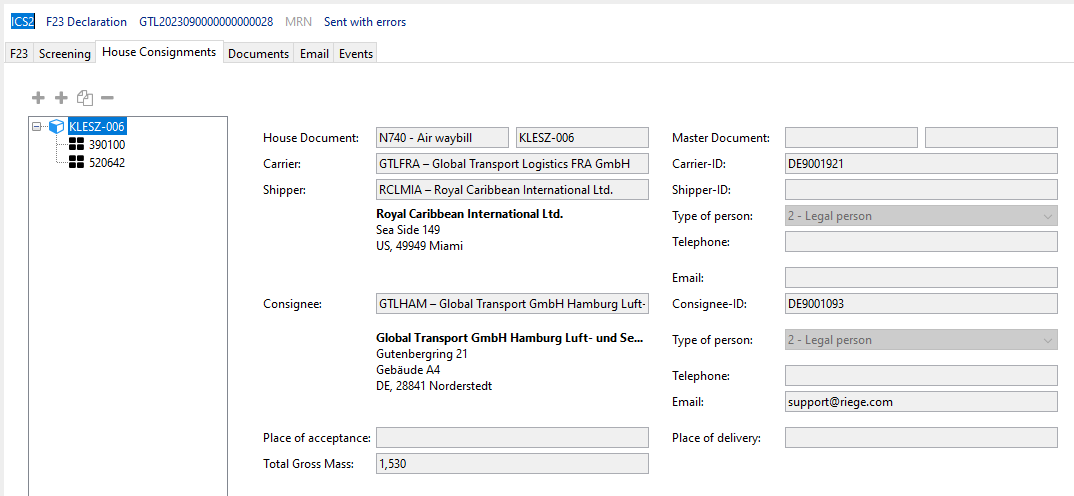
ICS2 registration/item level details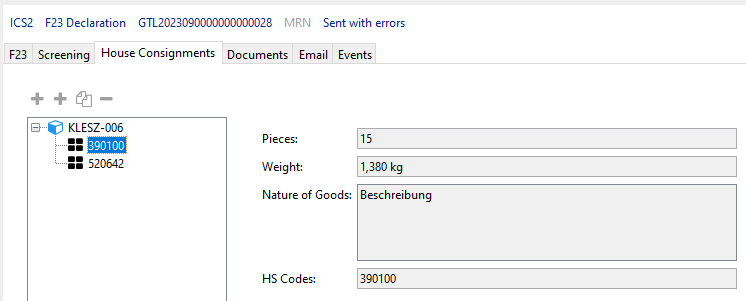
ICS2 dashboard with message flow per process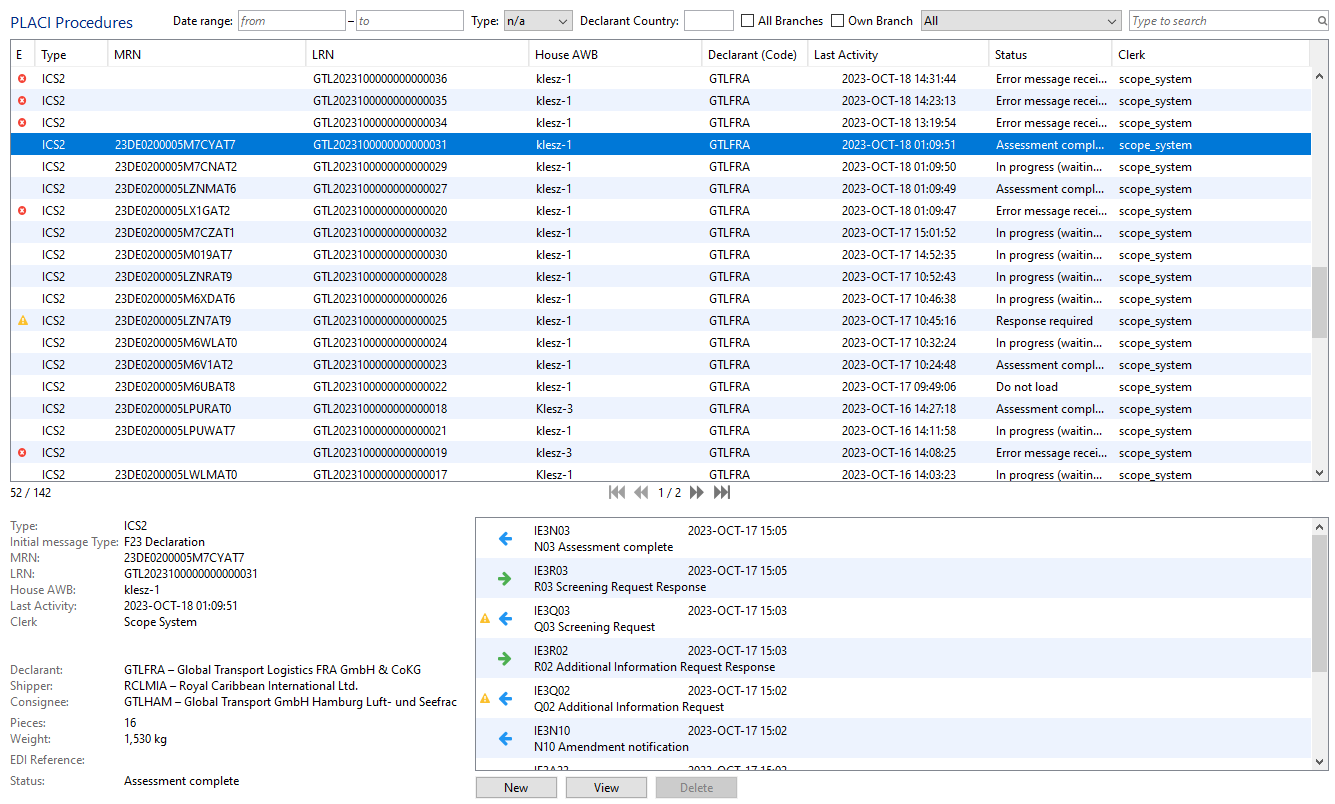
Main advantages for customers and users:
- More time until departure – less worry about the shipment
Shipments can be "security cleared" promptly. Although almost all airlines offer this service for freight forwarders, there is often only a small window of time before departure. Processing requests from ICS2 (obtaining documents, clarifying discrepancies, follow-up questions) is therefore always time-critical. In the worst-case scenario, the shipment is left standing. It is no longer possible to report such consignments to ICS after arrival. Shipments without "Assessment Complete" status remain at the origin – or not: ICS2 registrations from Scope give forwarders one less thing to worry about.
- Central processing – central training
Freight forwarders who report their shipments to ICS2 themselves save correspondence with carriers for shipments that require clarification or for which documents have been requested. As processing for all origin countries is carried out at a central location, there is no time pressure if the shipments are already on the pallet at the airline. And the need for training is also limited to one location thanks to centralization.
All new features, improvements and bug fixes can be found in the changelog.
Get to know 23.10 better in this session: Scope Top Features 23.10 for Air and Ocean.